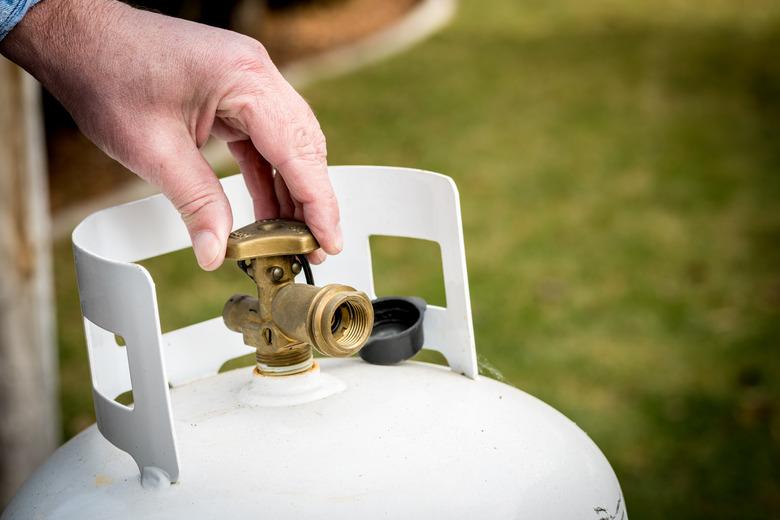Can A Propane Tank Explode?
Though propane tanks are often shown exploding in movies, games and TV shows, to the point that MythBusters did an entire episode on the subject, propane tank explosions are rare. According to an oft-quoted 1981 study from the Department of Energy, the risk of a person dying from a propane explosion is about one in 37 million, which is about the same risk you have of dying in an airplane crash. While it's true that propane is a flammable material, and that it's under pressure in a tank, propane tanks are hardy, durable containers with built-in safety precautions. Explosions are possible, but unlikely.
TL;DR (Too Long; Didn't Read)
What we commonly think of as propane explosions are actually the result of a gas leak being exposed to flame or very high temperatures. Propane _tanks_ exploding are a rare but possible occurrence: These explosions are a type of Boiling Liquid Expanding Vapor Explosion, or BLEVE, which occurs when the pressure of the propane tank exceeds the pressure it can safely vent, leading to the tank bursting open. Use safe handling and storage practices and check propane tank relief valves regularly to minimize the risk of an explosion.
Leaks and BLEVEs
Leaks
and BLEVEs
Propane-based accidents generally fall into two categories. Both are commonly considered as explosions, but the most common of these accidents have little to do with the tank itself. When propane explodes, it is usually the result of a propane leak, where a tank is left open and the gas dispensed from it is ignited. This is usually what happens when gas grills explode.
When the explosion is the result of the tank itself exploding, what's happening is a type of boiling liquid expanding vapor explosion, or BLEVE. A BLEVE occurs when the pressure of the propane tank exceeds the pressure it can safely vent. Rising pressure can then cause the tank to rupture and burst.
Explosion Causes
Explosion
Causes
When a propane leak causes an explosion, it has nothing to do with the tank itself. When the propane released from the tank builds in large amounts in a closed space, as can occur in a closed gas grill left alone for too long, exposure to flame or high heat ignites the gas and causes a fireball. When a BLEVE occurs, it is mainly due to the propane tank being exposed to incredibly high temperatures, like a fire. This heats the liquid propane inside the tank, expanding it to the point that it exerts too high a pressure on its container. The tank then ruptures and in certain scenarios can lead to an explosion.
Safety Measures
Safety
Measures
The first line of defense against a BLEVE is the relief valve that all propane tanks are equipped with. When the pressure inside the tank rises above a certain point, the relief valve automatically opens, venting gas to reduce the pressure. This is why it requires very high temperatures and direct exposure to pressure to cause a BLEVE to occur. Reducing the risk of propane leaks can be done through vigilance and careful attention. Always check to ensure that your propane tank is closed when not in use, regularly check the hoses and connections for leaks, and monitor gas grills while letting them heat up.
Cite This Article
MLA
Flournoy, Blake. "Can A Propane Tank Explode?" sciencing.com, https://www.sciencing.com/can-propane-tank-explode-7596402/. 9 May 2018.
APA
Flournoy, Blake. (2018, May 9). Can A Propane Tank Explode?. sciencing.com. Retrieved from https://www.sciencing.com/can-propane-tank-explode-7596402/
Chicago
Flournoy, Blake. Can A Propane Tank Explode? last modified March 24, 2022. https://www.sciencing.com/can-propane-tank-explode-7596402/
